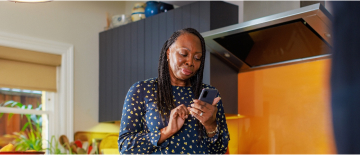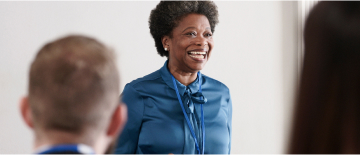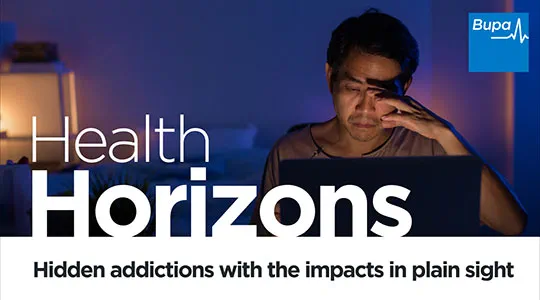Health Horizons
Supporting business leaders with our Health Horizons
Designed to support leaders in your business, our series of virtual events help you anticipate the challenges and opportunities that are shaping the future of workplace health and wellbeing.
Bringing together industry experts, innovators, and thought leaders, we’ll explore the emerging trends, cutting edge technologies and evolving practices in healthcare.
Tailored for senior leaders, HR professionals and wellbeing benefit managers, attendees will gain unique insights into the transformative landscape of workplace health and wellbeing.
Rewatch the latest live event
Creating psychologically healthy and safe workplaces supports mental wellbeing, inclusion, and engagement. Join our expert panel, including Bupa Asia Pacific, to explore leading practices and practical strategies for fostering healthier, more supportive, and high-performing work environments.
Our panellists will delve into key workplace risk factors, the role of leadership in fostering psychological health and safety, and how to implement effective, inclusive strategies that support mental health and drive organisational success.

Psychological health and safety in the workplace
Creating a psychologically healthy and safe work environment means identifying and managing the work-related factors that may pose a risk to employees’ mental health.
It’s about building a workplace that minimises harm and promotes wellbeing at work — not just responding when issues arise. Read our article to learn about psychological health and safety in the workplace.
Watch previous Health Horizon events
Our Resources

How to increase energy and productivity within your team

Winning the talent challenge

Empower your frontline managers
Watch our latest Academy videos
Supporting employees with dyslexia in the workplace
Learn how line managers can adapt their communication style to better connect and accommodate employees with dyslexia.
So dyslexia is a neurodevelopmental condition.
It’s rooted in the differences in how our brain processes language and symbols.
Processing ability, auditory processing and processing speed may all be impacted on dyslexia.
While dyslexia presents challenges in reading, spelling and writing, individuals with dyslexia can excel in other areas and often present strengths in creative thinking, problem solving, visual reasoning, and often join the dots where no one else can see them.
Though dyslexic thinkers are vital to the workplace and many organisations now are indeed wanting an advertising for dyslexic thinkers because these are the people who can assess information in a different way, who learn in different ways, and who can see those patterns and spatial awareness and be those lateral thinkers that other people don't and don't do automatically.
They've got really good interpersonal communication.
And remember, dyslexia is unique.
It's like a fingerprint.
And it's really important again, that you don't make generalisations and assumptions.So, some of the characteristics that you might see and remember, everybody is different, but you may see difficulties in reading, writing, spellings and sometimes in speaking.
Organisation skills may be challenged and time management following written information and verbal instructions can also challenging and confidence may be a little lower.
The verbal response may not often match the written responses, and that's really important.
If you see somebody speaking really well in the meeting, their report may not reflect that.
And joining the dots where others don't see them.
Look out for these people because they're you're dyslexic thinkers.
Seeing the bigger picture and thinking creatively are all areas where dyslexic people excel.
It’s key to educate yourself and your colleagues about dyslexia.
What does it mean to have dyslexia?
To try and make your colleagues feel who have dyslexia comfortable and happy in the workplace.
Also communication.
Make sure that you're keeping the information you're telling them as clear and concise as possible, whether it's in verbal or written format.
Use flowcharts and diagrams, visual aids if needed.
In meetings, make sure that the dyslexic person does not take the notes so they can concentrate
on the key parts of the meeting.Otherwise they're going to get lost, taking the notes and not understanding what's being said.
Dyslexic people have amazing creativity and they think outside the box, so try and use their key strengths.
Offering a dyslexia friendly environment is vital to people with dyslexia.
Make them feel comfortable in the workplace, and understand that internal emails and reports may be presented in different or alternative ways with reduced language.
Flexible deadlines are really good to support those time management issues.
So especially if you involve in large amounts of analysis of data or information that may require more time.
Provide computer software such as voice to text or note taking devices as this can really help productivity.
Adjustments in the workplace are vital, but speak to your dyslexic colleagues first to see what minor adjustments can be made and don't make assumptions because everybody's different.
Some adjustments may include: additional one to ones to ensure clear communication, computer software and devices to support grammar and spelling, flexibility on how information is presented, alternative methods of communication and meeting styles and the use of auditory literature can be really useful.
So avoid information overload.
Keep instructions clear and concise.
Make sure your priorities of the task are clear.Avoid long and complex meetings.
Follow up meetings with short emails and bullet points, visual support.
If the person is agreeable, then you might find that actually having an email banner which is explaining “I'm dyslexic, I'm really sorry if it's errors or typos within my email” might be really useful for internal emails.
And just make sure that all processes and systems within the workplace are clear and easy to find.
Made in dyslexia is a great community – they've got lots of information for employers and employees.
The BDA also offers lots of up to date research and findings and of course, websites like Dyslexia Test Centre.
We have lots of information on there to help support you in the workplace.
A guide for managers: is your team burnt out or busy?
We explore the difference between burn out and being busy, and how this might affect your team.
Hello, and welcome to the Bupa Bitesize Academy module.
I'm Emma Shatliff, manager of the Bupa Academy.
At Bupa we're serious about supporting mental health in the workplace.
In today's session, we'll be discussing the difference between between busy and burnout, specifically asking what line managers can do to spot the signs and symptoms and support their teams.
I'm delighted to be joined by Dr Naomi Humber, clinical psychologist and head of Mental Wellbeing at Bupa.
Welcome, Naomi, thanks for joining us.
And if you're ready, we'll get started with the first question.
What is burnout The World Health Organisation classified burnout as an occupational phenomenon, but what exactly is burnout and how might it impact the workplace?
Yeah, so burnout is conceptualised as a sort of syndrome that is resulting from chronic workplace stress that has been unsuccessfully managed.
So what we find is the certain characteristics that are present when someone is feeling burnt out, really.
So we've got feelings of exhaustion that could be physical, emotional, mental exhaustion, feeling a sense of distance from one's role and one's employer, potentially feelings of cynicism and negativity related to one's role, having poor professional efficiency and performance, potentially having a low morale.
And this can lead to obviously presenteeism, absenteeism and low productivity, not just for themselves, but also for their teammates as well, because that morale spreads to other people when they're very negative and cynical about what's going on.
So at what point does being good busy at work become burnout?
And how can managers spot the signs within their team?
So, being busy is actually really helpful for us.
Getting a job done, setting goals and achieving them, that is really important for us.
So a certain level of demand and stress is good for us.
However, there is an optimum level of stress and demand on us and if it goes beyond that, we end up in a situation which could go down the road of burnout.
Burnout is when we feel completely overwhelmed by the stresses and demands that have been placed and also we're placing on ourselves.
Someone's functioning and presentation in the workplace will tell us a lot about their mental health and well being.
We often see with burnout the physical symptoms come forward first, usually.
So what would happen is the person keeps going to the doctor about random ailments, headaches, migraines, aches and pains, things like that.
And so that is typical for people who are struggling with burnout.
Mental health symptoms can be lack of motivation, low energy, not really engaged in what's going on, maybe confrontational, irritable in the workplace more than usual.
It might be that they are struggling with low mood and anxiety and often feeling quite threat focused and everything is a catastrophe and something bad is going to happen in some way, shape and form.
Causes of burnout So what are some of the causes of burnout that line managers should be aware of?
So there's a range of different causes and it's often not just one cause.
When someone is burnt out in terms of the workload it can be too much on the person's plate, it might be that they've taken on too much they're not able to delegate for whatever reason.
It might be that the person is struggling within the workplace in terms of not feeling they've got a sense of control and autonomy within the work they do so they're not getting a saying things, for example, feeling that like the micromanaged It might be the community and the working environment so they don't feel part of a team connected to that team.
They don't feel like they've got anyone to turn to, to talk to or to get that support.
They might feel they've got a lack of recognition and reward for the work that they do and that might lead them to think, well, I need to overcompensate, I need to do more here rather than less to get that recognition.
It might be that they feel they're not psychologically safe in the workplace so there's an issue with fairness.
They might be very angry about something that's going on and that may lead to them feeling a lack of respect from that company.
It might be that the company values are going against their own personal values in some way and that generates a real negative association with the workplace.
There might be a glamorisation of work as well within some industries and sectors so going to work and being busy is seen as socially desirable and advantageous rather than anything else.
We find often that there are personality traits going on a lot of the time so it might be that the person is very much a go getter, overachiever really pushing themselves at all costs.
Very perfectionistic or the other side of it is that they feel very much that a people pleaser, saying yes to everything and self sacrificing a lot of the time.
Ways to prevent burnout So what are some of the ways line managers can prevent their teams from burning out?
So there's a range of ways really, so encouraging the team to set boundaries, saying no to things, to be able to say yes to things maybe outside of work.
Not pushing themselves too hard and delegating where appropriate and possible.
Thinking about clocking off and making sure that people are clocking off at the right time and taking that time to go and rest and recover for the next day.
Thinking about your own behaviour and how you role model what you're asking them to do so do you practise what you preach as well, which is really important.
Do you have a good work life balance too.
See it, say it.
So if you do see something within the workplace you are concerned about someone, try to bring it to their attention and try and nip it in the bud in a sensitive way.
Prioritising the team wellbeing as well, so making sure that everyone knows that that's high on your agenda and it's a priority for everyone.
Encouraging them to take breaks, take holidays, saying that they deserve those.
It's really important that we do that.
It's going to help with our productivity, our performance, but also we deserve to take that time away.
Boreout
Boreout is a related phenomenon that's arguably just as pernicious, but gets much less attention.
Could you explain what boreout means and how managers should tackle that?
Yeah, sure.
So boreout is feeling chronically bored and underwhelmed in the role that you're doing.
So it might be that the person feels very demotivated, under challenged, unstimulated in some way in the work that they're doing.
It has the same sorts of signs and symptoms as burnout, but it's got a very different cause, which is, as I say, they're not feeling motivated and the feeling quite demoralised within the work environment, not having enough demands and stress on them to perform to the best of their ability.
So it can be signs and symptoms such as low mood, anxiety, lack of energy and the impact on the work can be huge.
So it can be a lot of low productivity, presenteeism and absenteeism because of boreout.
We find that managers can prevent boreout by actually engaging the team, getting them all reenergized motivated, working cohesively together as a team, as a collective, sharing workloads, making sure that everyone has got enough work to be doing and the right sort of work for them and they're really engaged in what they're doing too.
It might be a role review.
So you look at someone's role and how they're getting on with things, it might be things to do with their habits, the way they work, and it might be that you need to mix it up a little bit.
I think what I'd call out here is as well, with the new normal, we're working from home a lot more, so it's sometimes difficult to spot as a line manager.
So it's extra important to have those regular meetings with people to ask open questions and have open conversations about how they're getting on.
Try and break that routine that the person's got, if that's a problem.
Rewarding staff and recognising them, appreciating them if they've done good work.
And asking if they got a project that they'd like to work on or would they like you to suggest one?
Thank you so much for your time, Naomi.
It's a really important topic, so we really appreciate you taking the time to answer those questions for us.
English (United Kingdom)

Watch our bitesize Academy videos
Our bitesize Academy videos provide an on-demand experience, designed to help line managers support their team’s health and wellbeing. Explore our videos to hear some of Bupa’s leading clinical experts provide tips, tools and resources on how to support employees in the workplace.
Visit the Workplace Health and Wellbeing Academy page for more information.
Workplace Health and Wellbeing Academy
Read our latest articles from the Health Horizon series

Is the dopamine economy impacting your workplace?
Prevention and treatment of addiction is changing as a result of improved understanding of the brain’s risk-and-reward chemistry and the wider impact of poor mental health2. Discover how your organisation can step up to this challenge and break the stigma around dependency and address issues before they reach crisis point.

Dependency and addiction: a health crisis hiding in plain sight
With increasing numbers of people seeking help for addiction and dependency3 and one in five adults drinking at levels which put their health at risk4, there is a strong business case for providing effective support and addressing issues before they escalate. There can be a strong link between poor mental health and dependency susceptibility. Learning about this cycle could help employers recognise the signs and open the dialogue about addiction and the hidden impacts in plain sight.

The pathway to preventing dependency issues
Online Cognitive Behaviour Therapy (CBT) and resources can help individuals identify root causes and use techniques to strengthen their mental health and resilience, aiming to steer them away from unhealthy habits. Wider access to evidence-based resources digitally can encourage employees to seek support on their terms and access help when they need it most. This push for early intervention strategies can support and equip the workforce with prevention tools to reduce issues spiralling and keep them feeling supported at work.

Healthcare is getting personal
One-size-fits-all advice and healthcare based on large population studies are giving way to a far more personal approach and a new era of genetic screening and predictive risk-scoring centred on disease prevention. Learn how this shift can deliver tailor-made support which helps build healthier teams, reduce absence and drive employee engagement.

Unlocking the benefits of targeted medicine
Genomics has transformed cancer care and prevention, but we are only beginning to unlock the benefits it will bring to cancer, heart disease and other health conditions. Discover how Bupa is identifying individuals at high risk of cancer, cardiovascular and other serious conditions and using precision medicine, pharmacogenomics and other advances to deliver targeted care.

DNA dividends
Whether it’s feedback from wearables and other digital devices, evidence-based health scoring or providing joined-up health insurance and care, data is at the heart of more personalised and preventative healthcare. We look at the myriad ways digital technology is being used to provide fast, convenient care and ensure improved and cost-effective outcomes.

The silent crisis in men’s health
Many men struggle to open up about their health. Every hour, 15 men die prematurely.1 Men with heart disease, diabetes and some cancers face worse outcomes than women.2 And men are three times more likely to take their own lives.1 This impacts business because the full-time workforce is predominantly male,3 so it's important that organisations provide access to the right support.

Supporting men with fertility
Huge numbers of men are affected by infertility and erectile dysfunction (ED). ED becomes increasingly common with age,4 but a quarter of men newly diagnosed are under 40,5 while infertility affects one in seven couples.6 We explore the underlying causes, and the impact these issues can have on men’s mental health and sense of self, at home and in the workplace.

Developing men’s mental health support that delivers
Poor mental health is a leading cause of absence,7 but men often delay seeking help because of gender stereotypes around masculinity and fears that it’s unmanly to admit you are struggling.8 We explore the evidence around these barriers, and how these attitudes can be used to provide tailored initiatives to support men’s health in the workplace.

Children in need of mental health support
One in six children and young people has a probable mental health condition9 and three-quarters of life-long mental health problems emerge before the age of 25.10 Rapid changes in brain chemistry during adolescence can leave young people vulnerable to issues, but this also provides a window for support.

Supporting child mental health delivers dividends
More than two-thirds of parents are worried about a child’s mental health.11 Half confirm this undermines their performance at work12 and 60% say it is impacting their own mental health.3 Learn more about the challenges facing families and the business benefits of creating a culture for change and providing effective support.

How businesses can help
There is no one-size-fits-all solution, but the first step should always be to signal that support is available, and that line managers are there to help. The key is to support positive conversations to encourage working parents to share their concerns before their children are in crisis. Making sure that line managers have the training and resources they need to be able to provide effective support and advice when it’s needed.

Fertility is becoming a business issue
As many as one in seven couples has difficulty conceiving14 and while fertility treatment offers hope, it is often associated with depression and anxiety. There may be worries around the cost of treatment and assisted reproduction can be physically and emotionally draining. Explore the issues and how to support employees on this path to parenthood.

How parenting can impact mental health
Sometimes the feelings of elation and excitement around starting a family are interwoven with negative emotions. As many as one in five women and one in ten men experiences anxiety and depression at this time. 15,16 And 12% of adoptive parents also struggle with low mood.17 Providing effective support gives business an edge when it comes to recruiting and retaining talent.

Creating a family-friendly workplace
There is a strong business case for pro-parenting policies, but delivering meaningful support may require a culture shift. We explore the core elements of an effective strategy and provide practical advice and tips on how to foster a family-friendly workplace for all.

Nurture and nature
Experts now believe the addictive personality is a myth, but there is compelling evidence that both inherited and environmental factors can increase the risk of developing an addiction to a substance or behaviour. Dr Naveen Puri, Medical Director for Bupa UK Insurance explores the complex interplay between genes, childhood experiences and lifestyles which can drive addiction.

Addictive behaviours undermine teams and productivity
Alcohol misuse alone costs the UK economy £7.3billion a year in lost productivity.18 It s a factor in 40% of accidents at work18 and two in five employees have gone to work under the influence of alcohol or impaired by a hangover.18 Learn about the work patterns and practices that can increase this risk and how to ensure the health and safety of teams.

How to provide effective support
Inaction on addiction is not an option, and different forms of addiction will present their own challenges and risks. We explore the core elements of an effective strategy and provide practical advice and tips on the steps organisations can take to support employees who are struggling with addictive behaviours while safeguarding teams and the bottom-line.

Prevention is a strategy for success
The business case for promoting workplace wellbeing is compelling. It’s good for business and it’s good for the wider economy. An ageing population, rising levels of obesity and poor mental health mean health prevention must be a priority for organisations seeking to recruit and retain strong teams.

Inclusivity: Creating thriving workplaces
Building a diverse and inclusive workplace is good for business. It also delivers benefits for all staff.32 But, this can mean addressing barriers and unconscious discrimination. We unpick these challenges and provide a roadmap of strategies and initiatives. This helps organisations create a more inclusive workplace.

Creating a healthy culture
Employee wellbeing priorities must be integrated throughout an organisation, embedded in its culture, leadership and people management. Discover what it takes to develop, and maintain, workplace wellbeing initiatives that are tailored to the needs of your teams.

A healthy environment is good for business
Prioritising sustainability is crucial for employee engagement and retention. The latest Bupa Wellbeing Index shows 45% of employees believe the opportunity to propose eco-friendly initiatives would boost their motivation.3 This rises to 56% for Gen Z.3 Discover how your business can be part of the climate-crisis solution

Digital delivers climate dividends
Advancing digital transformation will be key as we tackle the climate emergency. Remote consultations, innovation and smart tech can all improve access to healthcare. This is while reducing carbon emissions and other environmental burdens. Explore the innovations which will protect the health of our planet and people.

Creating a climate for change
“We need to move away from the traditional ‘make-use-dispose’ economic model,” says Dr Robin Clark, Medical Director of Bupa UK. Innovations applied at our Cromwell Hospital show how sustainability can save costs and the environment. Learn how collaboration across sectors, and Bupa’s eco-Disruptive partners, are driving change.

Tackling the crisis in men's mental health
Men are at much higher risk of poor mental health than women.19, 20 But, traditional views of masculinity often prevent them from seeking help when they are experiencing problems.21 Learn how to meet this challenge and discover how one firm in a male-dominated industry is making a difference.

Investing in mental health is a priority
Analysis shows that supporting mental health and wellbeing in the workplace can increase productivity by up to 12%.22 Also, every £1 invested will deliver a return of £5.23 Discover what makes an effective workplace programme in our article. We'll also give you the tools and resources to signpost to support emotional wellbeing across your teams.

Upskill managers to support mental health
Line-managers are at the frontline when it comes to providing mental health support. But, 46% are considering quitting because of their own struggles with work-related stress.24 We explore how to support these key employees with core standards that aim to embed positive policies and good practice.

Women’s health in the workplace
Women now make up 48% of the workforce,25 menopausal women are the fastest growing demographic in the workplace,26 and employment lawyers have flagged women’s health as a hot topic for 2023.27 Offering the right support will give organisations an edge in the competition for talent says, Bupa’s Clinical Lead for Women's Health Dr Samantha Wild.

Age diversity dividends
Almost three quarters of employers are actively trying to recruit older talent.28 And the CIPD says building age-diverse teams helps to address skills and labour shortages. As the risk of health problems increases and evolves with age, in this article we explore how providing the right healthcare support will enhance recruitment and retain talent.

Addressing disability in the workplace
A third of disabled employees don’t request reasonable adjustments for fear of being treated differently, yet 80% say they are more productive, and happier, when adjustments are made.29 Learn how to support the needs of team members with different disabilities by asking questions and encouraging open communication.

What is quiet quitting?
Quiet quitting has been the buzzword in 2022, but what does it mean, and what does it mean for your teams? We explore how this generational shift in attitudes to work is part of a bigger challenge around engagement - and the steps you can take to address it

Financial uncertainty
Money worries can increase the risk of poor mental health and 80% of employees say stress around personal finances impacts their performance at work15. Learn how businesses can support teams and the dividends this delivers in productivity and employee retention.
What’s on the Horizon for 2025
Secure your place at one of our upcoming virtual events

Event: How neuroinclusive is your workplace?
September 2025
Follow our LinkedIn page
Bringing the latest news and updates directly to your news feed, in real time. We want to hear from you directly, so we encourage you to like, share, comment and ask us questions.
1. Deloitte, UK, Poor mental health costs UK employers £51 billion a year for employees, May 2024
2. National Library of Medicine, The Neuroscience of Drug Reward and Addiction, 2019 DOI: https://doi.org/10.1152/physrev.00014.2018 3. Behavioural Health Tech, The Rising Tide of Workplace Stress: How Employers Can Support a Struggling Workforce, March 6, 2025 The Rising Tide of Workplace Stress: How Employers Can Support a Struggling Workforce 4. Drinkaware, Drinkaware reveals alcohol moderation is on the increase but one in five drinkers are putting their health at serious risk, September 2024 5. Movember Institude for Men’s Health (PDF, 11MB), 2024 UK report. 2 and 4 6. UK Parliament Post, Men’s Health, December 2023, DOI: https://doi.org/10.58248/PB56 7. UK Parliament, House of Commons Library, March 2024. 8. National Institute for Health and Care Excellence, October 2024. 9. Capogrosso P, Colicchia M, Ventimiglia E, Castagna G, Clementi MC, Suardi N, Castiglione F, Briganti A, Cantiello F, Damiano R, Montorsi F, Salonia A. One patient out of four with newly diagnosed erectile dysfunction is a young man--worrisome picture from the everyday clinical practice. J Sex Med. 2013 DOI:10.1111/jsm.12179 10. NHS England, August 2023. 11. CIPD Survey Report (PDF, 1.2MB), September 2023 12. Sagar-Ouriaghli I, Godfrey E, Bridge L, Meade L, Brown JSL. Improving Mental Health Service Utilization Among Men: A Systematic Review and Synthesis of Behavior Change Techniques Within Interventions Targeting Help-Seeking. Am J Mens Health. 2019. DOI: 10.1177/1557988319857009.Bupa health insurance is provided by Bupa Insurance Limited. Registered in England and Wales with registration number 3956433. Bupa Insurance Limited is authorised by the Prudential Regulation Authority and regulated by the Financial Conduct Authority and the Prudential Regulation Authority. Arranged and administered by Bupa Insurance Services Limited, which is authorised and regulated by the Financial Conduct Authority. Registered in England and Wales with registration number 38 29851. Registered office: 1 Angel Court, London, EC2R 7HJ.
Bupa Health Trusts are administered by Bupa Insurance Services Limited. Registered in England and Wales No. 3829851. Registered office: 1 Angel Court, London EC2R 7HJ © Bupa 2025








